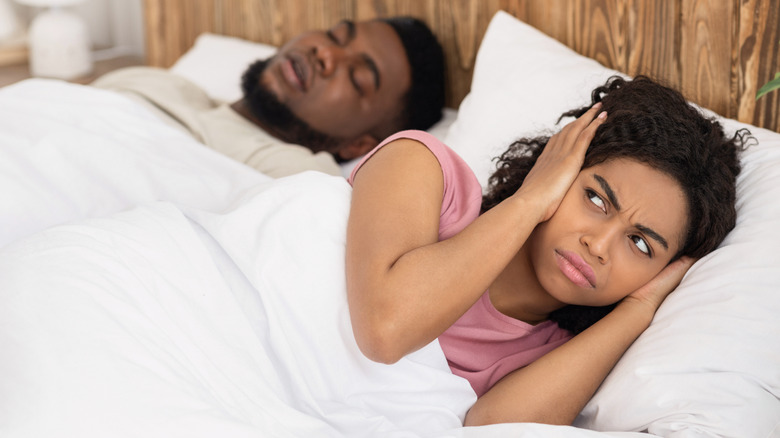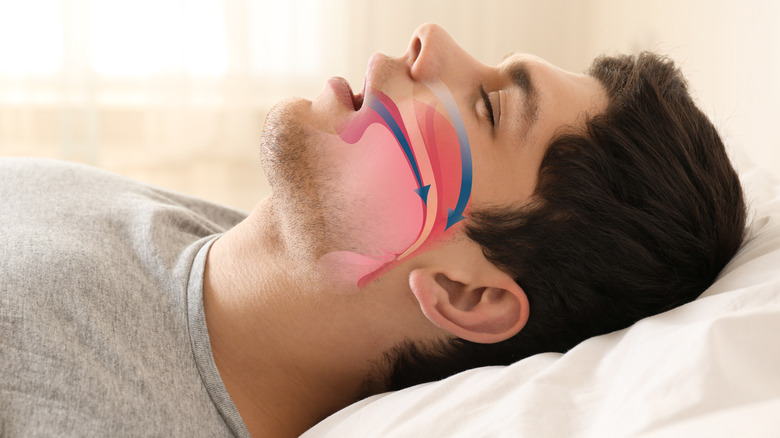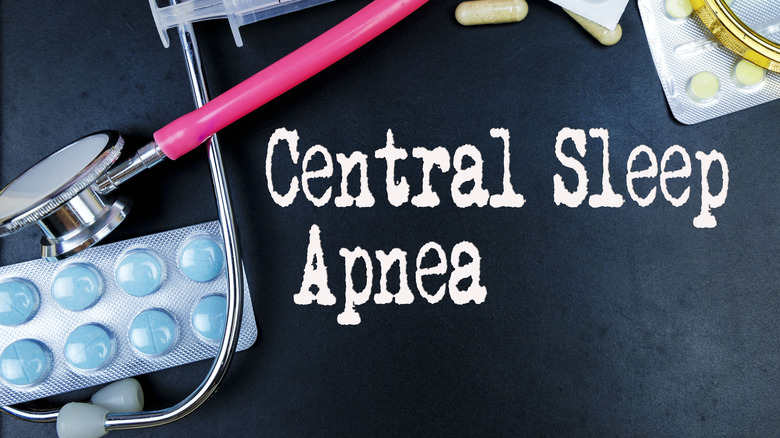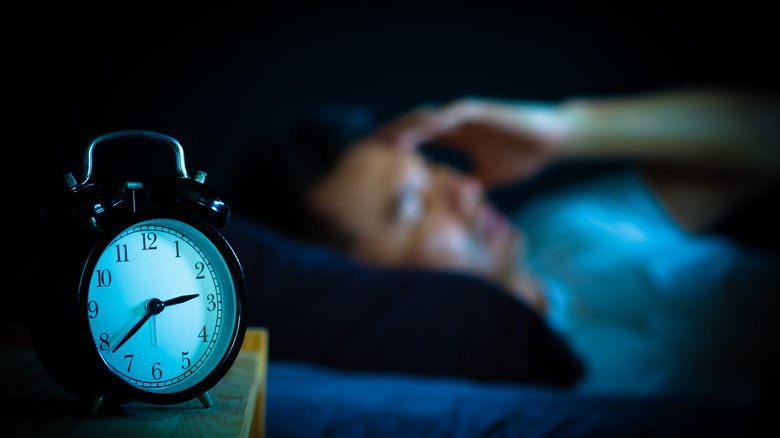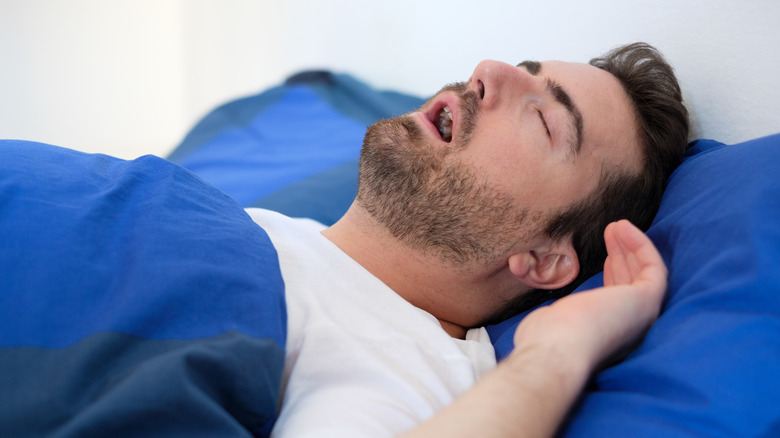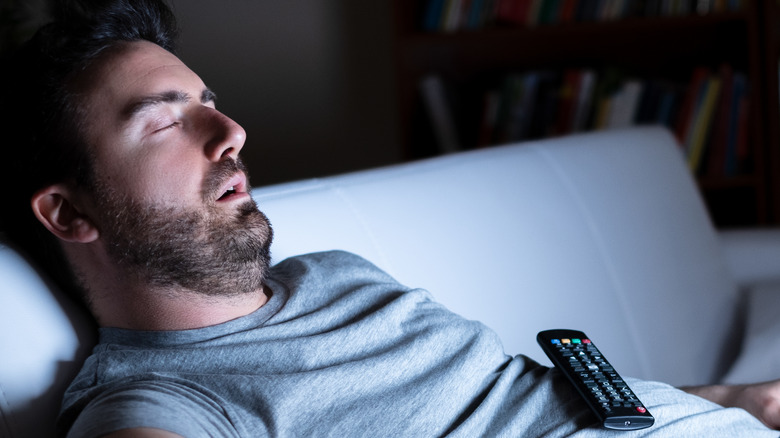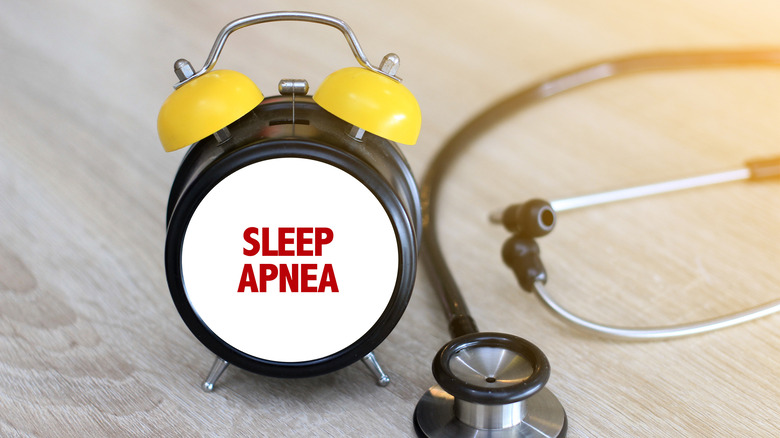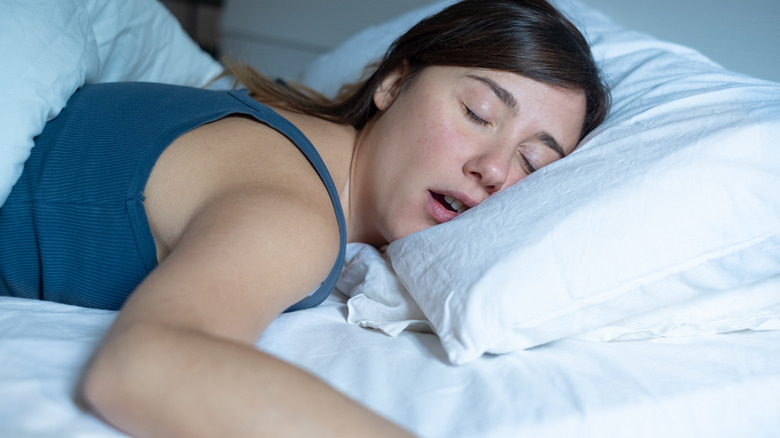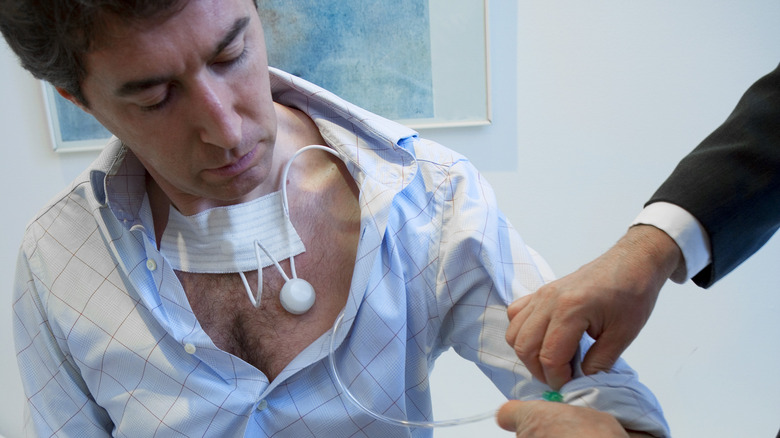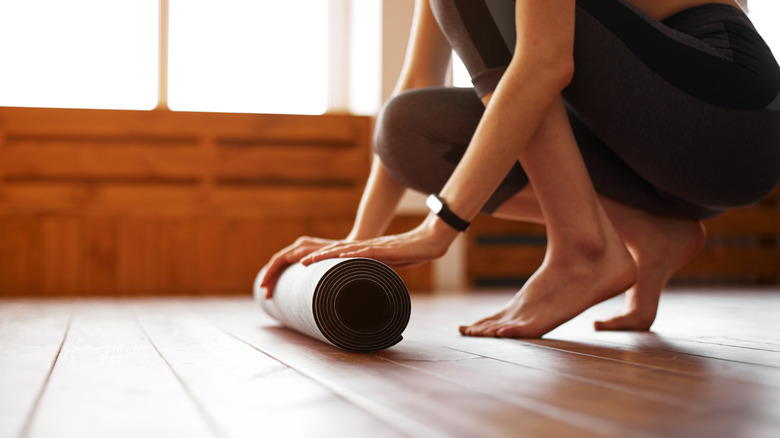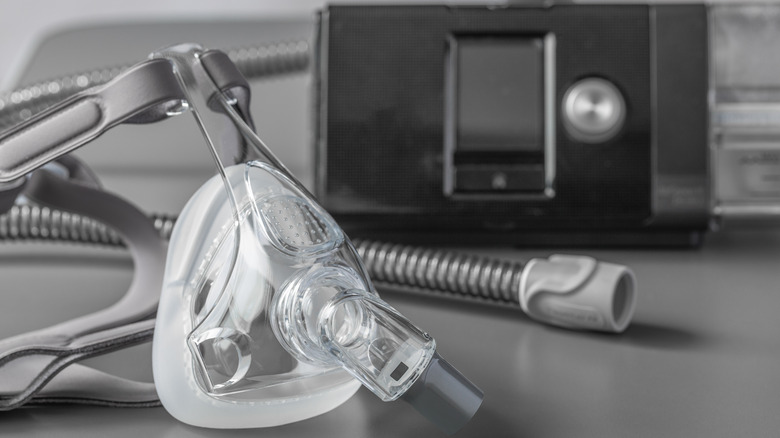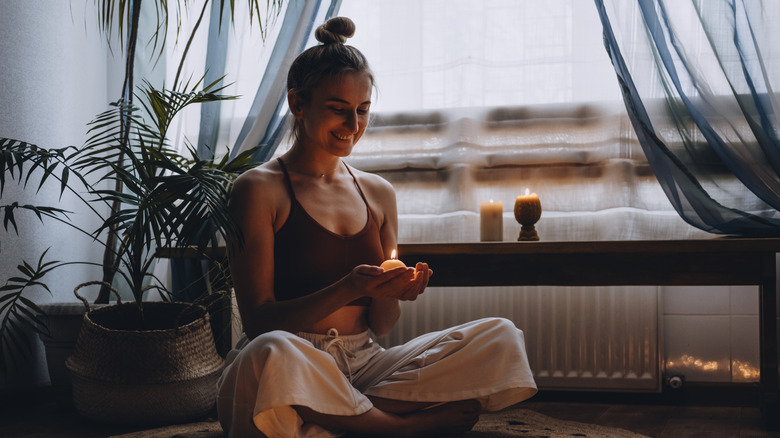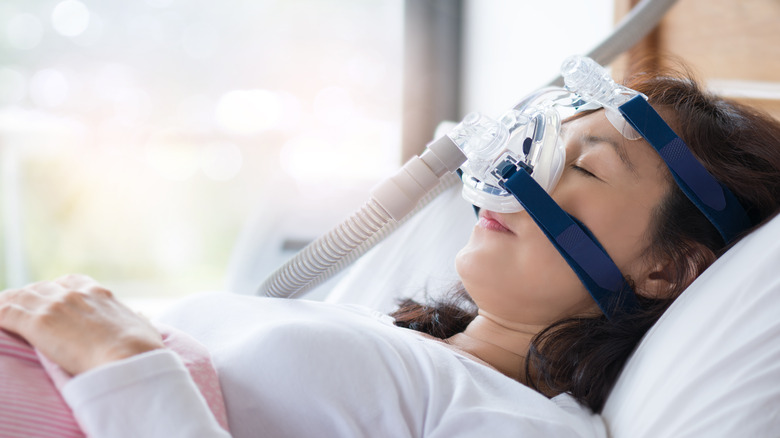Sleep Apnea Explained: Causes, Symptoms, And Treatments
Snoring while catching some zzzs is common. But if your snoring has gone from just irritating your sleep partner to the "irregular breathing" territory, you may have a disorder called sleep apnea (via Cleveland Clinic). Sleep apnea is when you stop breathing for extended pauses while sleeping. This halt in your breathing can have detrimental effects like dropping your heart rate and causing your body to startle awake. This, in turn, spikes your blood pressure and can lead to more serious health conditions — especially in your heart.
It's possible you could have this condition and not even know it. "Sleep apnea may be noticed more by the bed partner than by the sleeper. Your bed partner might notice that your breathing pauses, or they may complain of your loud snoring," Dr. Jonathan Jun, a pulmonary and sleep medicine specialist told Johns Hopkins Medicine. If you or your partner are dealing with sleep apnea, you shouldn't feel isolated. In fact, it is one of the most common sleep disorders in the country (via Sleep Foundation). It occurs most commonly in men (about 25%), and in nearly 10% of women — but it can also affect children, according to the Cleveland Clinic.
While sleep apnea is common, it goes largely untreated. Think you may have sleep apnea? Read on to find out more about the three different types of sleep apnea, its causes, symptoms, and treatments you can try to get a restful night of sleep.
Obstructive sleep apnea
Obstructive sleep apnea is the most common form of sleep apnea, affecting up to 9% of adults (via Sleep Foundation). This type of sleep apnea occurs when the muscles in your throat relax, causing the airway to become physically blocked and prompting your breathing to stop (via Mayo Clinic). Realizing that you are not getting oxygen, the brain kicks into gear, pushing you to wake up with a choke, gasp, or snort. And this won't just happen once during the night — it could be up to 30 times (or even more) each hour. In turn, that means you don't get restful sleep.
There's not a one-size-fits-all obstructive sleep apnea case. It can range from moderate to severe on a ranking system called the apnea-hypopnea index (AHI), which measures the average number of apnea or hypopnea episodes you have every hour (via Johns Hopkins Medicine). Hypopneas are when your breathing reduces but doesn't stop completely. An AHI of more than 30 episodes an hour classifies your case as severe, with a moderate case ranking at 15 to 30, and a mild case at 5-15.
Central sleep apnea
Central sleep apnea isn't as common as obstructive sleep apnea, and it's caused by a different mechanism. In this case, the culprit is the brain not sending the right signals to the muscles that control your breathing (via Mayo Clinic). As a result, your body doesn't try to breathe for a period of time. This type of sleep apnea is related to the nervous system function, and is more often found among people with other underlying issues such as heart or lung disease, or a neuromuscular condition such as ALS (via WebMD). Central sleep apnea also causes breathing to be shallower and slower than usual, according to the Sleep Foundation.
There are some subset types of central sleep apnea. Narcotic-induced central sleep apnea is when drugs like opioids affect the brain's ability to regulate breathing (via the Sleep Foundation). There are also other medical conditions that induce central sleep apnea. Cheyne-Stokes breathing is another form of central sleep apnea that causes hyperventilation followed by pauses in breathing. Higher altitude central sleep apnea can also occur at elevations higher than 15,000 feet.
Central sleep apnea affects less than 1% of adults over 40 years old, but like obstructive sleep apnea, it is more commonly diagnosed in men than women. However, in order to be diagnosed, the signaling problems between the brain and breathing muscles must be chronic — it is normal for many people to have a few central apneas a night when falling asleep or right after waking up.
Complex sleep apnea syndrome
Another form of sleep apnea is complex sleep apnea, or mixed sleep apnea — this is when someone has both obstructive sleep apnea and central sleep apnea at the same time (via the Mayo Clinic). This combination is also known as treatment-emergent central sleep apnea, as it's typically sparked after treatment begins for obstructive sleep apnea with a continuous positive airway pressure machine. It can resolve itself on its own, according to the Sleep Foundation.
Complex sleep apnea may be found in a sleep study, but in other cases it is diagnosed when obstructive sleep apnea treatment is not successful (via Medical News Today). One 2006 review published in Sleep found that complex sleep apnea was a more common diagnosis than solely central sleep apnea, accounting for 15% of sleep apnea cases (versus 84% for obstructive sleep apnea and 0.4% for central sleep apnea). Like other forms of sleep apnea, complex sleep apnea is more commonly found in men, according to Verywell Health.
Causes of sleep apnea
So how do you end up with sleep apnea? The causes for some sleep apnea conditions are unknown, but generally speaking there are myriad potential causes and risk factors including genetics, lifestyle choices, and other health issues (via National Heart Lung and Blood Institute). Obesity, large tonsils, endocrine disorders, neuromuscular disorders, heart or kidney failure, certain genetic syndromes, and premature birth are all health conditions might all contribute. Another cause of obstructive sleep apnea could be your family history and how your body is built, as your airflow can be affected by the size of your jaw, neck, tongue, and tonsils (via Sleep Foundation). Lifestyle choices that might play a role include sleeping on your back, smoking, and alcohol use.
Specific causes for central sleep apnea are heart failure, stroke, and neuromuscular diseases like amyotrophic lateral sclerosis (ALS) or Lou Gehrig's disease, according to the Cleveland Clinic. That form of the disorder is typically linked to another underlying medical condition.
Risk factors for sleep apnea that you can change
While there are numerous factors that contribute to sleep apnea, some people are more likely to develop or already be suffering from sleep apnea — but certain risk factors are under your control. First and foremost, staying healthy is key to avoiding sleep apnea (via Mayo Clinic). Obesity increases your chance for obstructive sleep apnea, as fat deposits around your airway can limit airflow. Your neck's size is also a risk factor, as thicker necks may cause narrower airways. Other contributing medical conditions such as type 2 diabetes and high blood pressure can also be improved with some lifestyle changes (via Healthline). Avoiding smoking, alcohol, sedatives, and tranquilizers can also reduce your risk.
If you need another reason to give up your vices, here's one — some family and genetic traits that can lead to sleep apnea can actually be reduced by living a healthy lifestyle (via National Heart Lung and Blood Institute). Otherwise, having a family member who suffers from sleep apnea may increase your risk of sleep apnea.
Risk factors for sleep apnea that you can't change
Unfortunately, there are some traits you can't change that may lead to a higher likelihood of developing sleep apnea. While you can experience sleep apnea at any age, the risk increases the older you get (via National Heart Lung and Blood Institute). Why, you may ask? As we age, the brain changes how it controls breathing during sleep, and more fatty tissue may be taking up residence in the neck and tongue. Sleep apnea is also more common in men in general, but for women, the risk of developing sleep apnea increases as they get older due to changes in weight distribution. "After menopause, hormones change and women tend to start looking like men in terms of where the weight gets put on. It's a time to be paying attention to the risks of sleep apnea because women begin to catch up to men in the rates of apnea after menopause," Dr. Jonathan Jun, a pulmonary and sleep medicine specialist told Johns Hopkins Medicine.
Other risk factors for sleep apnea include medical conditions like asthma, hormonal disorders, Parkinson's disease, polycystic ovary syndrome, and stroke (via Mayo Clinic).
Symptoms of sleep apnea
If you have sleep apnea, you may not even recognize your symptoms at first — they may be more obvious to someone you share a room with (via Sleep Foundation). Obstructive, central, and complex sleep apnea all contribute to poor sleep, and therefore have related symptoms such as breathing disruptions, daytime drowsiness, irritability, a limited attention span or fogginess, and morning headaches. Those who suffer from obstructive sleep apnea can also experience chronic loud snoring or gasping, dry mouth or a sore throat in the morning, and waking up with a need to urinate frequently.
There are additional signs of sleep apnea that may not seem like they should be related. Effects on your mood like anxiety or depression, night sweats, and sexual dysfunction are other symptoms reported by sleep apnea sufferers (via Cleveland Clinic). Symptoms specific to central sleep apnea are waking up frequently with possible choking or gasping, along with insomnia.
Sleep apnea symptoms may also look different for women and children than men. Women report symptoms of anxiety, depression, fatigue, headache, insomnia, and sleep disruption more often than men, according to the National Heart Lung and Blood Institute. As for children, worsened asthma, bedwetting, hyperactivity, and issues with their academic performance are commonly reported symptoms.
Complications caused by sleep apnea
Many people want to undergo treatment for sleep apnea solely to get better quality sleep. But there are other reasons to address your sleep apnea, as the condition can cause long-lasting and sometimes serious health complications. Sleep apnea is associated with cardiovascular issues like heart attacks, strokes, type 2 diabetes, and even a shortened lifespan (via Johns Hopkins Medicine). This connection may be due to the fact that obesity is the shared culprit between sleep apnea and these other health issues, according to pulmonary and sleep medicine specialist Dr. Jonathan Jun. "Our lab and others have shown that sleep apnea is associated with higher risks of diabetes, independent of obesity, and that sleep apnea can increase blood sugar levels," Jun told Johns Hopkins Medicine. Complications like metabolic syndrome leading to heart disease, liver problems, and issues with surgery and anesthesia can also be caused by sleep apnea (via Mayo Clinic).
The complications may also be the least of your worries if you are disturbing your partner with your sleep apnea. Loud snoring may lead to sleeping in different rooms and, combined with personality changes caused by lack of sleep, your relationship may be negatively impacted (per the Journal of Clinical Sleep Medicine).
Diagnosing sleep apnea
Getting a diagnosis for sleep apnea will first require a visit to your doctor for a review of your medical history and a physical exam (via National Heart Lung and Blood Institute). Your doctor will likely want to check if you have additional complications related to sleep apnea such as atrial fibrillation, high blood pressure, or type 2 diabetes. In a physical exam, your doctor will want to check your tonsils and airway for possible obstruction, as well as your jaw structure and tongue position. Your doctor may also do a blood test panel on your thyroid and hormones, as well as a pelvic ultrasound to rule out polycystic ovarian syndrome, as these tests can determine whether you may have an underlying condition that's causing the sleep apnea.
If your doctor suspects sleep apnea is a possible diagnosis, they will likely order a sleep evaluation or overnight sleep study. A sleep study consists of a polysomnogram that monitors your air flow, breathing patterns, blood oxygen level, the brain's activity, eye motion, heart rate, and muscle activity overnight in a lab (via Cleveland Clinic). A take-home sleep study test is possible, but doesn't have the same monitoring capabilities as a lab study. This process should enable your medical team to diagnose if you have sleep apnea and, if so, what type and the severity level of mild, moderate, or severe.
Lifestyle treatment options
If you have been diagnosed with sleep apnea, the first recommendations by your doctor may be to make some tweaks to live a healthier lifestyle. Eating healthy with a focus on cardiovascular fitness, physical activity, and losing weight if necessary are some key lifestyle changes that can help with sleep apnea (via National Heart Lung and Blood Institute). In fact, as little as a 10% weight loss can lead to less apneas occurring overnight for many patients, according to the Cleveland Clinic.
Limiting your alcohol intake before going to sleep, as well as quitting smoking and avoiding sedatives like sleeping pills are other changes that can have a positive effect on your sleep apnea. "We know that [alcohol] reduces the tone of the upper airway breathing muscles," Meir Kryger, a sleep medicine specialist at Yale Medicine, told WebMD. "But also, people who drink a lot of alcohol tend to put on weight."
Doctors may also treat any nasal allergies or congestion you may have, and might even recommend you switch your sleeping position. Mild cases of sleep apnea may only need tweaks like these to resolve issues. However, your doctor may recommend other treatment options if your sleep apnea is a severe case.
Treatment using breathing and oral devices
If lifestyle changes don't do the trick to solve your sleep apnea, a breathing or oral device may be recommended. The most common device recommended for sleep apnea is a continuous positive airway pressure machine, or a CPAP machine (via Johns Hopkins Medicine). This machine keeps those pauses in your breathing at bay by pumping air through your nose and keeping your throat open. "CPAP is the first-line treatment, and it's very effective," Dr. Jonathan Jun told Johns Hopkins Medicine. Jun added that using a CPAP machine regularly reduces blood pressure, improves the daytime drowsiness, and results in an overall better quality of life.
Oral devices may also be a treatment option for your case of sleep apnea. Mandibular advancement devices can help those with mild to moderate obstructive sleep apnea (via Cleveland Clinic). These devices can reposition your jaw and prevent your tongue from blocking your airway (via Cleveland Clinic). Some people report that their dental devices can be as effective as a CPAP machine, according to WebMD. You will want to discuss these options with your doctor and visit a dentist for a specially fitted device if deemed necessary.
Treatment via surgery or implants
There are more drastic measures to take if lifestyle changes and breathing devices don't improve your sleep apnea. Potential surgical procedures would likely deal with your throat, nose, or mouth (via National Heart Lung and Blood Institute). For instance, a tonsillectomy removes the tonsils at the back of your throat, and a tracheostomy creates a hole for a breathing tube in your neck. A maxillary or jaw advancement surgery moves your jaw forward to create more room for your airway.
Surgically placed implants are also a new technique to treat sleep apnea. One implant device stimulates your muscles to open your airways while you sleep. A nerve stimulator for your tongue can also be inserted, as this can help keep your tongue in a position that doesn't impede breathing.
If your sleep apnea seems to be created by issues in your nose, a deviated septum surgery may be recommended, according to the Cleveland Clinic. Many surgeries for sleep apnea are outpatient procedures. Your doctor will be able to discuss all your options to determine which one is right for you.
Healthy sleeping habits
You should also practice good sleep hygiene to treat your sleep apnea. This includes a sleep environment that is quiet and dark (or only dimly lit if you prefer some light), and a bed that is reserved for sleep and relaxation only (via National Jewish Health). If you yourself distracted by looking at the clock, remove it from the room. Keeping your bedroom at a cool but comfortable temperature is also helpful (via American Academy of Sleep Medicine). Altogether, your bedroom should be an oasis of relaxation to promote good sleep.
If you find you have difficulty falling asleep and staying in a deep sleep, try meditation. Experts also tell WebMD to avoid electronics before bed, and to keep a strict sleep schedule throughout the week. Even though it may be hard, try to not nap during the day and carve out 7-9 hours a night for sleep.
How to be safe with sleep apnea
Sleep apnea doesn't have to be life-changing in a negative way. You can live a safe, healthy, and happy life while keeping your sleep apnea in check. You will want to continually monitor your sleep apnea with sleep studies, at-home monitors, and regular visits to your doctor (via MedicineNet). This is important for your health and safety, as sleep apnea can cause life-altering side effects due to lack of sleep: "We're talking about car accidents in the daytime, lost productivity at work, mood swings, waking up feeling groggy and falling asleep in class," sleep medicine specialist Jonathan Jun told Johns Hopkins Medicine.
Looking for additional information on living with sleep apnea? The National Heart Lung and Blood Institute offers tips on how you can be safe while using your CPAP and sleeping devices, and when to talk to your doctor if you have concerns with your treatment.

